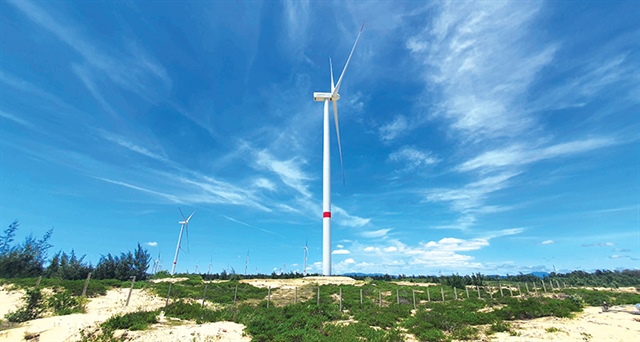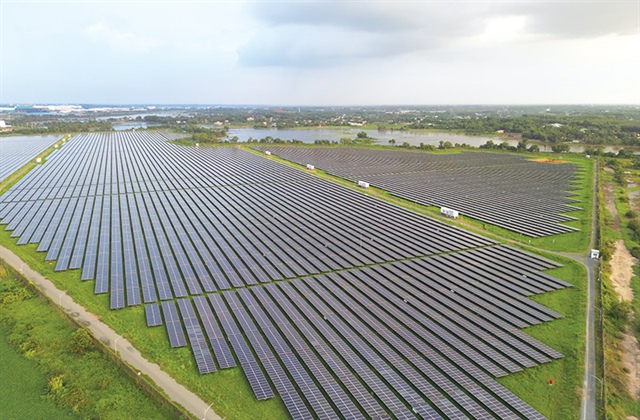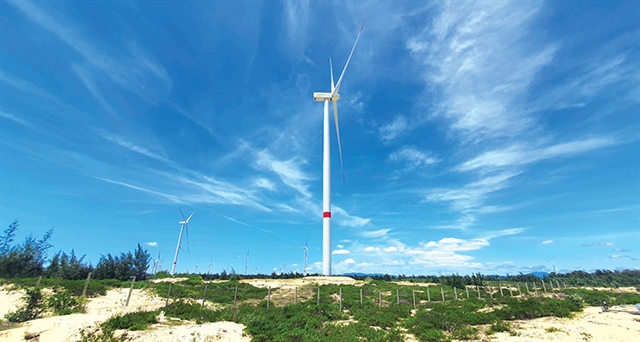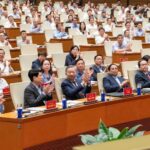
The Power Law 2024, which came into effect on February 1, 2025, marked a significant step forward in完善ing the legal framework for the electricity industry. Photo: H.P |
Vietnam is facing significant development demands and global challenges such as climate change and the sustainable energy transition. The 8th Power Development Plan (PDP VIII), approved by Decision No. 500/QD-TTg dated May 15, 2023, and later adjusted by Decision No. 768/QD-TTg dated April 15, 2025, sets ambitious goals for the power sector, requiring substantial investment in power generation and grid infrastructure.
At the same time, Vietnam has committed to achieving net-zero emissions by 2050, which necessitates a high penetration of renewable energy (RE) in the power grid, targeting 28-36% (excluding hydropower) by 2030 and aiming for 74-75% by 2050.
Therefore, power market reforms are more urgent than ever to lay the foundation for sustainable socio-economic development.
A Robust Legal Foundation for a Competitive Power Market
One of the prerequisites for Vietnam to progress towards a competitive retail power market – the final stage of power market reform – is a strong legal basis.
The Power Law 2024, effective from February 1, 2025, has played a pivotal role in完善ing the legal framework for the power sector. Its scope explicitly includes the “competitive power market, power trading activities” and provides a more direct and robust legal foundation for developing the various stages of the power market.
The law also offers detailed provisions on power development planning, investment in construction projects, renewable and new energy development, operating licenses, power system dispatch, the operation of the national power market, and state management of the power sector.
The new Power Law, coupled with the spirit of Resolution No. 66-NQ/TW dated April 30, 2025, issued by the Politburo on innovating legal construction and enforcement, creates a clear synergy. The resolution aims to address legal “bottlenecks” by 2025 and完善 the legal system on investment and business by 2028, with the goal of elevating Vietnam’s investment environment to a leading position in ASEAN.
Impetus from the Private Sector and Investment Attraction
PDP VIII estimates the need for massive investment in new power generation and grid infrastructure, especially in renewable energy sources, with projected figures of $136.3 billion for the 2026-2030 period, $130 billion for 2031-2035, and $569.1 billion for 2036-2050. The plan diversifies investment forms (state, private, public-private partnerships – PPPs, etc.) and strongly encourages private sector participation, fully aligning with the orientation of Resolution No. 68-NQ/TW dated May 4, 2025, on developing the private economic sector, which is considered a crucial driver of the national economy by 2030.
The combination of PDP VIII identifying investment needs and directions, the Power Law 2024 providing a specialized legal framework for power activities, and Resolution 68 creating a conducive and equitable environment for the private sector forms a mutually reinforcing policy trio. From the writer’s perspective, progressing towards a retail power market with multiple competitive wholesale buyers will facilitate longer-term power purchase agreements for investors, reducing risks. This prerequisite for socialization and investment attraction in the power sector is essential.
Modernization and Operational Efficiency through Science, Technology, and Digital Transformation
The future modern power market, particularly with a high proportion of volatile renewable energy sources and the involvement of flexible, controllable sources like energy storage, gas-fired power, and demand-side participation, necessitates a smart and efficient operating system based on advanced technology and big data. Resolution No. 57-NQ/TW dated December 22, 2024, issued by the Politburo on breakthroughs in science, technology, innovation, and national digital transformation, provides strategic direction in this regard.

The Power Law 2024, effective from February 1, 2025, has played a pivotal role in完善ing the legal framework for the power sector. Photo: H.P |
Resolution 57 sets ambitious goals for Vietnam to be among the leading ASEAN countries in digital competitiveness, e-government development index, and artificial intelligence (AI) research and development by 2030. It emphasizes the development of modern digital infrastructure and the utilization of data as a key production resource, promoting big data and the data industry. This aligns perfectly with the requirements for building a smart grid capable of integrating and safely operating large-scale renewable energy sources as outlined in PDP VIII.
In a competitive power market, the collection, processing, analysis, and accurate forecasting of vast data on power generation, consumption, pricing, trading, weather, and climate are crucial. The digital platforms, AI applications, and big data initiatives promoted by Resolution 57 will greatly support the establishment and efficient operation of a transparent power market.
Resolution 57 also focuses on developing high-quality human resources and reforming state management based on technology. This addresses the need to strengthen human capabilities and governance in the power sector, especially in the power market. Moreover, digital transformation in administrative procedures, in line with Resolutions 66 and 68, will reduce compliance costs and enhance the efficiency of power companies and investors.
Alignment with Overall Socio-Economic Goals
The power market reform journey is not just a technical or sector-specific economic endeavor; it is intimately linked to Vietnam’s overall socio-economic development goals. All three resolutions – 66, 57, and 68 – share the common vision of building Vietnam into an industrialized country with a modern economy and high middle income by 2030 and a high-income country by 2045.
Power market reforms toward competition and transparency will contribute to system-wide cost optimization, ensure power supply security, and provide more reasonable electricity prices in the long term. A reliable, efficient, and reasonably priced power system is fundamental to all production and business activities, especially as Vietnam strives to enhance its national competitiveness.
With a transparent market-based pricing mechanism, consumer疑惑 about electricity prices will diminish, and they will be more accepting of market-determined rates, adjusting their consumption patterns accordingly. Market mechanisms will also motivate consumers to use electricity more efficiently and conservatively, reducing the pressure to invest in unnecessary new power generation and grid infrastructure. This aspect is crucial for ensuring overall economic efficiency for the power system and the wider economy and society.
Additionally, the goal of a sustainable energy transition, emissions reduction, and the pursuit of net-zero emissions by 2050 are integral to the model of green economic development and climate change response. The Power Law 2024, with its detailed provisions on renewable and new energy development, and PDP VIII reflect consistency with this objective.
The synergy between these policies ensures that the development of the power sector and power market reforms are on the right track, meeting energy needs while contributing to sustainable development, improving people’s lives, and enhancing the country’s stature.
Challenges and Recommendations
While these pivotal policy documents have created a positive legal corridor and direction, the path ahead remains challenging. Although the competitive wholesale electricity market (VWEM) has been operational since 2019, in essence, it remains a market dominated by a single buyer, mainly EVN. The current wholesale market design has revealed inadequacies in the face of rapid growth and ambitious environmental sustainability goals.
To truly realize the potential offered by the synergy of these policies, Vietnam should focus on the following key aspects:
Firstly, appropriate power market design. The power market needs to be redesigned to fit the new context of a high proportion of renewable energy sources and rapid development demands. This includes examining new capacity management mechanisms and long-term power purchase agreement (PPA) structures suitable for different power generation technologies and flexible resources. The experience of countries like Australia in reforming market design to adapt to the energy transition offers valuable lessons.
Secondly, an efficient and independent governance structure. While the separation of the National Load Dispatch Center (AO) from EVN to form the National Power and Electricity Market Operator (NSMO) under the Ministry of Industry and Trade is a step in the right direction for ensuring independence and transparency, further efforts should aim to establish other power market governance agencies (such as policy advisory, design, and regulatory bodies) that operate independently with sufficient authority and resources.
Thirdly, human resources development. Power market reform is a comprehensive and complex transformation journey. Special policies are needed to attract and develop a leadership team and human resources with a deep understanding of the power market and sustainable energy transition for the power sector’s governance agencies.
Fourthly, the urgency of power market reform. Delays in implementing power development plans have already had repercussions for power supply security. Similarly, postponing the implementation of appropriate power market mechanisms will have adverse effects on power development and socio-economic progress. Consideration should be given to classifying projects under the power market reform program as urgent and critical electricity development projects that require top priority.
The new resolutions and the Power Law 2024 establish a synchronized policy framework that facilitates power market reform, power sector development, and the advancement of Vietnam’s economy toward higher goals. However, success hinges on the vigorous, synchronized, and effective implementation of the assigned tasks and solutions, particularly in crafting concrete, feasible, and competitive market mechanisms that attract private sector investment and effectively harness the achievements of science, technology, and digital transformation.
Dr. Thai Doan Hoang Cau
– 07:00 06/05/2025
Over 1.5 Million Delegates Attend National Conference to Propagate and Implement Resolutions 66 and 68
“On Monday, May 18th, the Political Bureau and the Secretariat held a nationwide conference to promulgate and implement Resolution No. 66-NQ/TW, dated April 30, 2025, issued by the Political Bureau regarding the innovation of legal construction and enforcement to meet the country’s development demands in the new era. Additionally, they also discussed Resolution No. 68-NQ/TW, dated May 4, 2025, which focuses on the development of the private economy.”
National Conference on the Propagation and Implementation of Resolutions 66 and 68 of the Political Bureau.
“Today, on May 18th, the Political Bureau and the Secretariat organized a national conference to propagate and implement Resolution No. 66-NQ/TW, dated April 30, 2025, by the Political Bureau regarding the innovation of legal construction and enforcement to meet the country’s developmental demands in the new era. Additionally, the conference aimed to address Resolution No. 68-NQ/TW, issued on May 4, 2025, focusing on the development of the private economic sector.”
“Overcoming Challenges: Unleashing the Potential of Vietnam’s Private Sector”
“During the National Conference on May 18, Prime Minister Pham Minh Chinh pointed out a slew of shortcomings hindering the development of the private sector, ranging from institutional and cognitive aspects to implementation. Despite accounting for 50% of GDP, this sector still faces a “double bind” in terms of legal framework, credit, and connectivity.”
“Revolutionizing Governance for a Soaring Nation”
“General Secretary To Lam penned an article titled, ‘Breaking Through with Institutions and Laws for a Nation’s Ascension’. He emphasizes that superior institutions and laws, aligned with the developmental needs and aspirations of the people, are paramount to a nation’s success. Thus, to propel our country forward, we must vehemently reject any limitations or shortcomings within our institutions and laws. We cannot compromise with any weaknesses in policy design, legislation drafting, or implementation. The Government Portal is honored to present the entirety of Comrade General Secretary’s insightful article.”





















